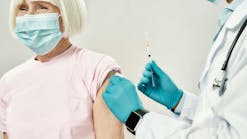Studies show COVID-19 virus likely has multiple infection routes
As the COVID-19 outbreak grows in China and abroad, new studies attempt to answer questions on how the virus is shed and the range of clinical outcomes, with two studies indicating that shedding—and therefore transmission—likely occurs via multiple routes.
Currently, testing for and confirmation of infection with COVID-19 is conducted via oral swabs. But in a study published in Emerging Microbes & Infections, Chinese scientists report evidence of an oral-fecal transmission route for COVID-19 viruses and show that, in hospitalized patients, viral RNA was found in anal swabs and in blood samples.
The study was conducted in a Wuhan, China, hospital, with samples collected from 178 patients. The study authors found viral nucleotide in anal swabs or blood even when it was not detected in oral swabs, especially in patients who had been receiving supportive care for several days.
The results also showed that the timing of positive swabs changed. On the first day of illness, 80 percent of oral swabs were positive in a small group of patients, but by day five, 75 percent of anal swabs were positive for COVID-19 viral RNA, and only 50 percent of oral swabs were still positive in the same patients with lab-confirmed COVID-19.
"These data suggested a shift from more oral positive during early period (as indicated by antibody titres) to more anal positive during later period might happen," the authors said.
The results of the study are the first to show COVID-19 could be transmitted via respiratory, fecal-oral, or body fluid routes, the authors say. They also warn that a patient with negative oral swabs after several days of illness may still be capable of transmitting the virus.
In a report from the Chinese Center for Disease Control, authors describe how they isolated the virus from a stool sample of a patient with COVID-19.
"Respiratory droplets and contact transmission are considered to be the most important routes of transmission of 2019-nCoV, but do not fully account for the occurrence of all coronavirus disease 2019 (COVID-19) cases, previously known as novel coronavirus pneumonia (NCP), and the reasons for the rapid spread of this virus," they write.
The finding suggests stool can contaminate hands, food, water, and, as with the other study, it points to multiple routes of transmission.





